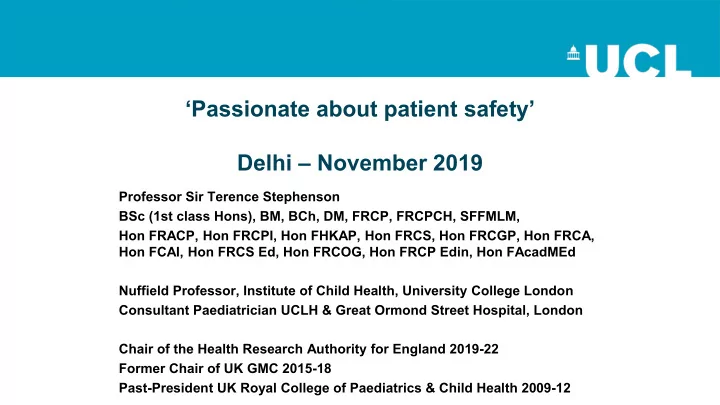

‘Passionate about patient safety’ Delhi – November 2019 Professor Sir Terence Stephenson BSc (1st class Hons), BM, BCh, DM, FRCP, FRCPCH, SFFMLM, Hon FRACP, Hon FRCPI, Hon FHKAP, Hon FRCS, Hon FRCGP, Hon FRCA, Hon FCAI, Hon FRCS Ed, Hon FRCOG, Hon FRCP Edin, Hon FAcadMEd Nuffield Professor, Institute of Child Health, University College London Consultant Paediatrician UCLH & Great Ormond Street Hospital, London Chair of the Health Research Authority for England 2019-22 Former Chair of UK GMC 2015-18 Past-President UK Royal College of Paediatrics & Child Health 2009-12
Why is this talk so relevant to India today? The Indian government has moved towards proprietary standards for identification and traceability The need for globally harmonised standards is crucial as healthcare becomes a global industry and the world becomes a global village I will give some positive experiences when using them to improve patient safety Identification of pharmaceuticals also helps counter fraud GS1 standards are one leading example of globally harmonised standards
Is the NHS safe? Of the top 20 risk factors for all deaths, adverse in-hospital healthcare events come eleventh – above alcohol, drugs, violence and road traffic accidents. In the NHS each year there are: 624 million prescriptions, 300 million GP visits, 13 million OPD visits, 5.3 million admissions, 2.9 million emergency ambulance calls, and an estimated 900,000 adverse events. Every week – two wrong site surgeries and two operations with kit wrongly left inside. NEVER EVENTS 2016/17= 400 wrong site/retained foreign body/wrong implant = 79%; Medication error causing harm = 12% Adverse events (unintended injury caused by medical management rather than disease) lead to an additional three million NHS bed days. Costing at least £1 billion a year.
Wayne Jowett died following an inadvertent intrathecal vincristine injection, the 23rd such incident reported worldwide (and the 14th in 15 years in the United Kingdom)
Advisor to the National Patient Safety Agency, 2003-2006:
Problems with identification of intravenous infusions
Computerised prescribing with computerised decision support can decrease serious medication errors by 55% - 64%
2010 MHRA safety alert: metal-on-metal hip replacements 2010 MHRA safety alert: PIP silicone implants Barcoding allows tracking of: Patient Product (UDI) Place
Reducing the % – worthwhile? If 99.9% were good enough… • Major plane crash every 3 days • 12 babies given to wrong parents every day • 37,000 ATM errors every hour Institute for Healthcare Improvement (data relate to US population)
FINISHED FILES ARE THE RESULT OF YEARS OF SCIENTIFIC STUDY COMBINED WITH THE EXPERIENCE OF MANY YEARS
Do you want to be a patient in a hospital where safety is not taken as seriously as your next airline flight?
THANK YOU
Recommend
More recommend